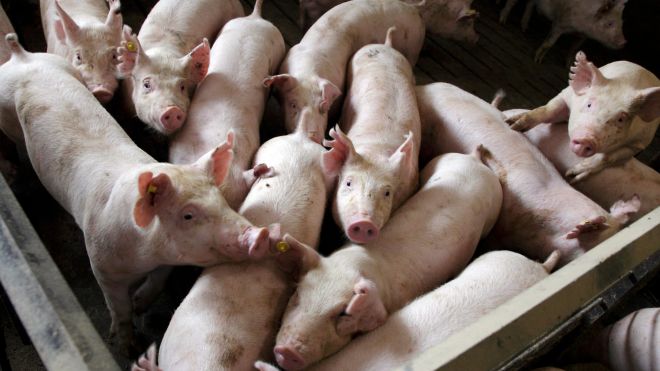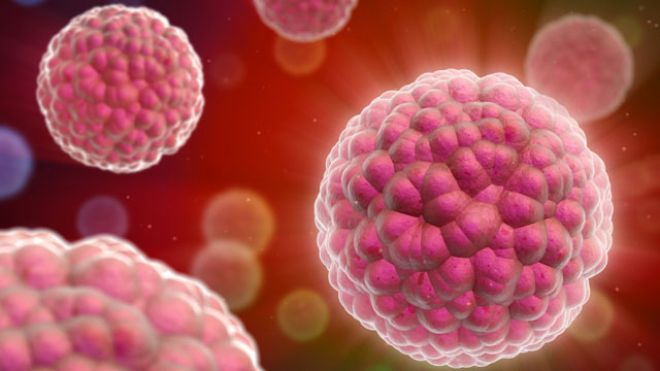Tag Archives: cancer
Swine virus confirmed in Iowa, Indiana hog herds
Farms in two of the nation's leading pork producing states have tested positive for the potentially fatal porcine epidemic diarrhea virus (PEDV), U.S. pork industry veterinarian official said Monday. Three farms in Iowa and one Indiana operation have confirmed cases of the virus, said Dr Lisa Becton, director of swine health information and research for the National Pork Board. The cases in Iowa were located on farms “all across the state, not in one specific area,” Becton said. PEDV does not pose a food safety or health risk to humans and the pork is safe eat. Other animals cannot contract the swine-only virus. Still, this marks the first time PEDV had been found in the United States, and poises yet another challenge for hog farms still recovering from record-high feed costs from last summer's historic drought. “The severity of the outbreak is not yet known, but we're hoping to have a better assessment soon,” Becton told Reuters. Iowa is the nation's leading hog producer with more than 20 million hogs and Indiana is No. 5 with 3.65 million, according to USDA. Agriculture Department officials are pulling together an agricultural epidemiologic survey, and plan to send the questionnaire out to swine veterinarians in the coming days, to try to determine how the virus was introduced into the nation's pork production chain and see how it spread, Becton said. Swine veterinarians across the U.S. are collecting samples from pork farms that have reported possible cases and sending them in for testing at National Veterinary Service Laboratories and other sites. Some veterinarians are also sending in samples of animal feed for testing, to see whether the virus was spread that way, said Dr. Keith Roehr, Colorado's state veterinarian. “There's a lot of biosecurity and prevention measures in place that prevent the spread of disease. That's what's so puzzling in this case. To be in different states, and to have crossed between different swine operations and between different owners, all of which are painstakingly kept separate to prevent the spread of disease - that's unusual,” said Roehr. There is no cure or vaccine for PEDV, which causes diarrhea, vomiting and dehydration in hogs and could result in deaths - particularly in baby pigs whose immune system can be weak. The virus is similar in some ways to transmissible gastroenteritis (TGE) where mortality can range from 50 percent to 100 percent among pigs that are a week old or younger, Becton said. Older pigs can be affected but will recover in a matter of a few weeks after contracting the disease. There is no effective treatment for PEDV other than good care, warm housing and adequate water to combat dehydration. Strict bio-security and quarantine measures can help to slow the spread of the virus. PEDV also is sensitive to heat and sunlight, which may help curtail the spread of the outbreak as the weather turns warmer in the Midwest, veterinarians say. While this marks the first appearance of PEDV in the U.S., the virus dates back to the 1970s. Over the years, it has cropped up on pork operations in England, Canada, China and South Korea and Japan, said Becton. The U.S. Department of Agriculture's National Veterinary Services Laboratories confirmed it had detected the virus in hog populations in Iowa on Friday, and noted that the disease may have spread to other hog producing states. The virus is also not expected to threaten U.S. pork exports, said Becton, who explained USDA does not consider PEDV a reportable disease to the World Organization for Animal Health, so no trade restrictions are expected. Roughly 23 percent of U.S. domestic pork production, which last year totaled 5.383 billion pounds worth $6.322 billion (U.S.) is earmarked for export.source : http://www.foxnews.com/health/2013/05/21/swine-virus-confirmed-in-iowa-indiana-hog-herds/
Terminal teen whose farewell song became web hit dies of cancer
A Minnesota teenager whose farewell song “Clouds” became an Internet sensation with nearly 3 million views on YouTube died Monday after battling a rare form of bone cancer, his family announced. Zach Sobiech, of Lakeland, died at his home, surrounded by family and his girlfriend, according to a CaringBridge post by his mother, Laura Sobiech. He was 18. Zach Sobiech's family declined a request for an interview from the St. Paul Pioneer Press, but released a statement announcing his passing. “It is with heavy hearts that we announce the passing of our son Zachary David Sobiech. Our family has been blessed not only by his amazing presence in our lives, but also by the love and support of our family and friends and by so many people in the community. In particular we'd like to thank those people who listened with their hearts and helped Zach bring his message and his music to the world,” the statement said. Sobiech began writing songs of farewell to family and friends last fall. His first song, the catchy “Clouds,” inspired tributes and covers, including a celebrity video. Sobiech was told in June 2012 that he had months — perhaps a year — to live. When a scan in October showed about 20 new lesions in his lungs, Sobiech's mother suggested he start writing letters to say goodbye. “I'm not good at writing letters,” Sobiech told the Pioneer Press in December. “So I figured instead, I could just write songs for people, and they might be around longer. It's more powerful than writing a letter because a song can get stuck in your head. You find yourself humming it during the day.” In February, Rock the Cause digitally released Sobiech's album, “Fix Me Up,” which he co-wrote with bandmate Samantha “Sammy” Brown, and he flew to New York, where he signed with BMI, a music-rights management company that will collect royalties for him. Proceeds from the sale of “Clouds” and Sobiech's other songs also are going to the Zach Sobiech Osteosarcoma Fund. In addition to raising money for the fund in his name at the Children's Cancer Research Fund, Sobiech worked to raise awareness for children suffering from his rare form of cancer. “Our thoughts and prayers are with Zach's family and friends,” said John Hallberg, the fund's CEO. “Zach Sobiech faced his cancer diagnosis with grace and strength. His music touched millions, and he leaves a lasting legacy that will help other young cancer patients through the Zach Sobiech Osteosarcoma Fund. Zach once said, 'You don't have to find out you're dying to start living.' He taught us all how to live, and we are all better for having known him.” Sobiech, who would have graduated from Stillwater Area High School on June 8, received his diploma early — through his family at his house in late April, according to Lind Moncrief, assistant to the principal at the high school. Counselors and support services are available for students at the school. A funeral Mass will be held at 11 a.m. Thursday at the Church of St. Michael in Stillwater.source : http://www.foxnews.com/health/2013/05/21/terminal-teen-whose-farewell-song-became-web-hit-dies-cancer/
5 biggest mistakes people make with food and exercise
Whether you earn your living working up a sweat, or squeeze in workouts when you can, it's easy to fall prey to eating errors that unintentionally hold you back from getting the most out of your workouts. Here are five common missteps I see, and how to correct them to reap the rewards of your hard work. Eating too little fat Despite my recommendations to include good fats at every meal, like avocado, nuts, seeds, and coconut oil, some of my clients remain fat phobic, and will scale back, fearing that fat is “fattening.” But the truth is, getting enough fat is a smart strategy for both sports nutrition and weight control, because fat: delays stomach emptying, so you feel fuller longer; increases satiety, to shut off hunger hormones; boosts antioxidant absorption, which in emerging research is related to leanness; and ups metabolic rate, to help you burn more calories. In fact, fat is one of the most vital nutrients in your diet, because it's a structural part of your cells, which means you can't heal a cell or construct a new one without enough fat to perform these important jobs. Cutting back too much can result in fatigue, chronic hunger, or a lack of satiety, irritability, depression, a weaker immune system, and an increased injury risk. So even if you're trying to reduce your body fat percentage, don't be afraid to add almond butter to a smoothie, top your salad with avocado, and sauté your veggies in extra virgin olive oil. Filling the fat gap can be the key to finally seeing results. Health.com:  Are You Making These Dieting Mistakes?
Tunisia announces 3 cases of coronavirus, 1 death
Tunisia's Health Ministry says a 66-year-old man has died after being infected by the new coronavirus following a visit to Saudi Arabia. The ministry's statement reported that his son and daughter were also diagnosed with the virus but have been treated and since recovered. The cases are the first for Tunisia and indicate that the virus is slowly trickling out of the Middle East, where more than 30 cases have been reported. There have been at least 20 deaths from the virus worldwide. The Tunisian, a diabetic, had been complaining since his return from a trip to Saudi Arabia and Qatar and died from acute respiratory distress at a hospital in Monastir. The new coronavirus is related to SARS, which killed about 800 people in 2003, mostly in Asia.source : http://www.foxnews.com/health/2013/05/21/tunisia-announces-3-cases-coronavirus-1-death/
Timing of cancer radiation therapy may minimize hair loss
The study, which appears in the early online edition of the Proceedings of the National Academy of Sciences (PNAS), found that mice lost 85 percent of their hair if they received radiation therapy in the morning, compared to a 17 percent loss when treatment occurred in the evening. The researchers, from the Salk Institute for Biological Studies, the University of Southern California (USC) and the University of California, Irvine (UCI), worked out the precise timing of the hair circadian clock, and also uncovered the biology behind the clockwork — the molecules that tells hair when to grow and when to repair damage. They then tested the clock using radiotherapy. …
10 ways to relieve stress naturally
Commonly used catheters double risk of blood clots in ICU and cancer patients
But compared to other central venous catheters (CVCs), these commonly-used catheters (known as PICCs) more than double the risk of dangerous blood clots — especially among patients who are critically ill or who have cancer, according to a new University of Michigan Health System study published in The Lancet. …
Kava plant may treat anxiety
An extract from the kava plant can treat people with chronic anxiety, an study from Australia finds. Patients with generalized anxiety disorder who took kava extract tablets for six weeks showed a significant reduction in their symptoms, compared with a control group that took placebo pills, the results showed. The study confirms previous findings showing the anti-anxiety effects of kava, a psychoactive plant native to the Pacific region. Kava is culturally important among many Pacific Islanders, and is used in rituals and ceremonies. Consuming kava may induce a mild sedation and euphoria, a numbing effect and enhanced social interaction. It is prepared in various forms, such as grinding the plant or brewing its roots. It's believed the roots contain chemicals that may treat anxiety. The active ingredients of the plant are compounds called kavalactones. These chemicals have similar effects to medications such as Xanax, which are used to treat anxiety and panic disorders. In the new study, 75 patients with anxiety disorders were given either kava or placebo pills, and their anxiety levels were regularly assessed over the next six weeks. Patients who consumed kava tablets showed significant improvements in their symptoms, as measured by a commonly used psychological test. By the end of the experiment, 26 percent of kava-consuming patients were in remission from their symptoms compared with 6 percent of the placebo group, according to the study, which was published this month in the Journal of Clinical Psychopharmacology. Kava is less addictive and has a lower risk of side effects compared with conventional anxiety medications, according to the study. In the study, some people taking kava reported headaches, but no other side effects were seen. Previous studies have suggested the plant may have negative effects on the liver, but liver tests in the study participants showed no problems. Researchers also found that peoples genetics may affect their response to kava. Genes that code for proteins that transport a brain chemical called GABA may play a role in this, . If this finding is replicated, it may pave the way for simple genetic tests to determine which people may be likely to have a beneficial anxiety-reducing effect from taking kava, said Jerome Sarris, study author from the University of Melbourne. The new study adds to the evidence of kava's medicinal potential. A 2010 reviewof 12 controlled trials concluded that kava is likely to be an effective treatment for anxiety, and its short-term use is likely to be safe. The reviewers, however, called for larger studies to bolster these results. Kava is a major export of the Pacific. It was once banned in some Western countries, primarily out of concern for its alleged effects on the liver. It is now legal in most places and available in various forms, such as in relaxation supplements and anti-energy drinks. Copyright 2013 LiveScience, a TechMediaNetwork company. All rights reserved. This material may not be published, broadcast, rewritten or redistributed.source : http://www.foxnews.com/health/2013/05/20/kava-plant-may-treat-anxiety/
UK aims to make gene testing more accessible for cancer patients
Britain launched a research program on Monday that should eventually allow all cancer patients to have access to the kind of genetic analysis that led Hollywood star Angelina Jolie to decide to undergo a double mastectomy. The project, involving the Institute of Cancer Research (ICR) in London, the U.S. gene sequencing firm Illumina, geneticists and cancer doctors, aims to find a way to allow more cancer genes be tested in more people. Researchers announcing the 2.7 million pound ($4 million) project, funded by the Wellcome Trust medical charity, stressed this was not a response to reports last week of Jolie's decision to undergo surgery to reduce her breast cancer risk. “What we're trying to do here is develop processes that will allow comprehensive and systematic use of genetic information in cancer medicine so that (more people) will be able to benefit from the types of information and situations we were hearing about last week (with the Jolie story),” said Nazneen Rahman, head of genetics at the ICR and a leader on the new project. Mutations in some genes, known as cancer predisposition genes, greatly increase the risk that a person will get cancer. Jolie tested positive for a high risk gene mutation that made her about five times more likely to develop breast cancer than women who do not carry this mutation, according to the U.S. National Cancer Institute. There are nearly 100 other known cancer predisposition genes, but in Britain - where most healthcare is part of the taxpayer-funded National Health Service - testing for them is currently very restricted. Yet recent advances in reading the genetic code, known as gene sequencing, mean that looking for gene mutations is now faster and cheaper than ever - paving the way for gene testing eventually to become routine for all cancer patients. “It is very important to know if a mutation in a person's genetic blueprint has caused their cancer,” Rahman told reporters at a briefing in London. “It allows more personalized treatment, so for example such people are often at risk of getting another cancer and may choose to have more comprehensive surgery, or may need different medicines, or extra monitoring.” The program, called Mainstreaming Cancer Genetics, will use a new Illumina test called TruSight that can analyze 97 cancer predisposition genes within a few weeks for a few hundred pounds, Rahman said. The new model will be piloted initially in women with breast or ovarian cancer at London's Royal Marsden hospital, but the team hopes it will in future be used across the country and in many more types of cancer.source : http://www.foxnews.com/health/2013/05/20/uk-tries-out-new-model-for-gene-testing-in-cancer-patients/






